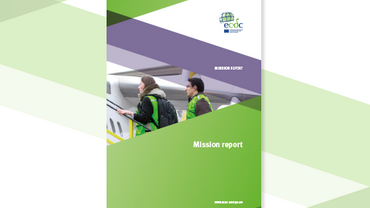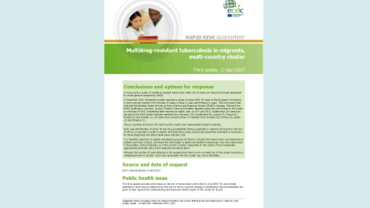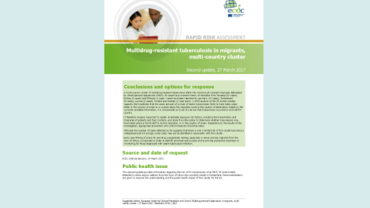Risk assessment guidelines for infectious diseases transmitted on aircraft (RAGIDA) – Tuberculosis
This guideline document presents several procedures intended to assist in the evaluation of risk for transmission of tuberculosis on board aircraft.
The RAGIDA project combines evidence retrieved from the literature with expert knowledge for infectious diseases. The resulting operational documents provide a host of viable options for decision-makers, particularly when faced with the choice of whether to contact trace air travellers and crew that were potentially exposed to infectious diseases during a flight.
Executive Summary
ECDC revised the tuberculosis section in its Risk Assessment Guidelines for Infectious Diseases Transmitted on Aircraft (RAGIDA). The new guidelines include an updated systematic review on TB transmission on aircraft, which concludes that there is still not enough evidence of the effectiveness of identifying, tracing and investigating the passengers that might have been infected during a flight.
The results of the systematic literature review showed that TB transmission in aircrafts is possible but very rare. To date, no cases of TB disease as a consequence of transmission during a flight have been described in the literature.
According to the guidelines, contact tracing of passengers exposed to TB during air travel should only be considered if the index case is confirmed as having infectious pulmonary TB, if there is evidence of transmission to other contacts, if the flight has been longer than eight hours and if the time between flight and diagnosis of the case does not exceed three months.
The passengers selected for contact tracing should be the ones sitting in the same row, two rows ahead and two rows behind the index case. Exposure of crew is generally less intensive. The same procedures apply if the index case has a multidrug-resistant or extensively drug-resistant form of TB (MDR TB or XDR TB).
The RAGIDA project
International flights present a risk to the spread of airborne diseases carried by infected travellers. The RAGIDA reports aim to provide options for decision-makers when faced with the choice of whether to contact trace air travellers and crew that were potentially exposed to infectious diseases during a flight.
The series of guidelines documents - which started in 2009 -, combine evidence retrieved from the literature with expert knowledge for infectious diseases. The RAGIDA report on Tuberculosis represents the consensus opinion resulting from an expert meeting organised by ECDC in October 2013.







